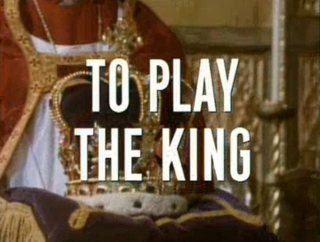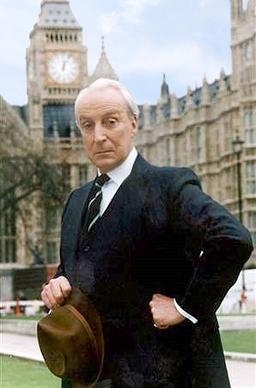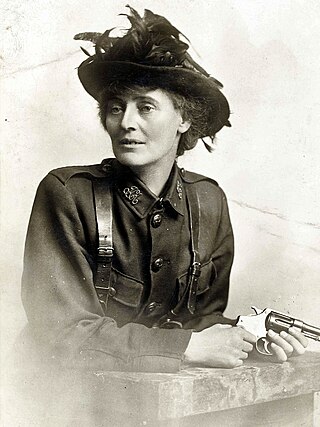
House of Cards is a 1990 British political thriller television serial in four episodes, set after the end of Margaret Thatcher's tenure as Prime Minister of the United Kingdom. It was televised by the BBC from 18 November to 9 December 1990. Released to critical and popular acclaim for its writing, direction, and performances, it is considered one of the greatest British television shows ever made.

Margaret Hilda Thatcher, Baroness Thatcher, was a British stateswoman and Conservative politician who served as Prime Minister of the United Kingdom from 1979 to 1990 and Leader of the Conservative Party from 1975 to 1990. She was the longest-serving British prime minister of the 20th century and the first woman to hold the position. As prime minister, she implemented economic policies that became known as Thatcherism. A Soviet journalist dubbed her the "Iron Lady", a nickname that became associated with her uncompromising politics and leadership style.

William Stephen Ian Whitelaw, 1st Viscount Whitelaw, was a British Conservative Party politician who served in a wide number of Cabinet positions, most notably as Home Secretary from 1979 to 1983 and as de facto Deputy Prime Minister of the United Kingdom from 1979 to 1988. He was Deputy Leader of the Conservative Party from 1975 to 1991.

Richard Edward Geoffrey Howe, Baron Howe of Aberavon,, known from 1970 to 1992 as Sir Geoffrey Howe, was a British politician who served as Deputy Prime Minister of the United Kingdom from 1989 to 1990. A member of the Conservative Party, he was Margaret Thatcher's longest-serving Cabinet minister, successively holding the posts of chancellor of the Exchequer, foreign secretary, and finally leader of the House of Commons, deputy prime minister and lord president of the Council. His resignation on 1 November 1990 is widely considered to have precipitated the leadership challenge that led to Thatcher's resignation three weeks later.

First Among Equals is a 1984 novel by British author Jeffrey Archer, which follows the careers and personal lives of four fictional British politicians from 1964 to 1991, with each vying to become Prime Minister. Several situations in the novel are drawn from Archer's own early political career in the British House of Commons, and the fictional characters interact with actual political figures from the UK and elsewhere including Winston Churchill, Alec Douglas-Home, Harold Wilson, Edward Heath, Margaret Thatcher, Douglas Hurd, Muammar al-Gaddafi, Gary Hart and Queen Elizabeth II.
The 1990 Conservative Party leadership election was called on 14 November 1990 following the decision of Michael Heseltine, former defence and environment secretary, to challenge Margaret Thatcher, the incumbent Prime Minister of the United Kingdom, for leadership of the Conservative Party.

To Play the King is a 1993 BBC television serial and the second part of the House of Cards trilogy. Directed by Paul Seed, the serial was based on Michael Dobbs' 1993 novel of the same name and adapted for television by Andrew Davies. The opening and closing theme music for the TV series is entitled "Francis Urquhart's March", by composer Jim Parker. The series details the conflict between British Prime Minister Francis Urquhart and a newly crowned king as well as the run-up to the general election.

Francis Ewan Urquhart is a fictional character, the villainous main protagonist of Michael Dobbs's House of Cards trilogy of novels. In the television series he is portrayed by Ian Richardson. A member of the Conservative Party, Urquhart is as a ruthless politician who rises from Chief Whip of the Conservative Party to Prime Minister of the United Kingdom through treachery, deception and murder. He is married to Elizabeth Urquhart, who appears to have a great deal of power over her husband, and often identifies his powers and abilities, or persuades him to use a given situation to his advantage. The protagonist had a sexual relationship with Mattie Storin in the first serial and one with Sarah Harding in the second serial.

The modern political history of the United Kingdom (1979–present) began when Margaret Thatcher gained power in 1979, giving rise to 18 years of Conservative government. Victory in the Falklands War (1982) and the government's strong opposition to trade unions helped lead the Conservative Party to another three terms in government. Thatcher initially pursued monetarist policies and went on to privatise many of Britain's nationalised companies such as British Telecom, British Gas Corporation, British Airways and British Steel Corporation. She kept the National Health Service. The controversial "poll tax" to fund local government was unpopular, and the Conservatives removed Thatcher as Prime Minister in 1990, although Michael Heseltine, the minister who did much to undermine her, did not personally benefit from her being ousted.

Sir Peter Hugh Morrison was a British Conservative politician, MP for Chester from 1974 to 1992, and Parliamentary Private Secretary (PPS) to Prime Minister Margaret Thatcher.
The Chief Whip of the Conservative Party oversees the whipping system in the party, which is responsible for ensuring that Conservative MPs or members of the House of Lords attend and vote in parliament in the desired way of the party leadership. Chief Whips, of which two are appointed in the party, a member of the House of Commons and a member of the House of Lords, also help to organise their party's contribution to parliamentary business.

Margaret Thatcher was Prime Minister of the United Kingdom from 4 May 1979 to 28 November 1990, during which time she led a Conservative majority government. She was the first woman to hold that office. During her premiership, Thatcher moved to liberalise the British economy through deregulation, privatisation, and the promotion of entrepreneurialism.

The representation of women in the House of Commons of the United Kingdom has been an issue in the politics of the United Kingdom at numerous points in the 20th and 21st centuries. Originally debate centred on whether women should be allowed to vote and stand for election as Members of Parliament. The Parliament Act 1918 gave women over 21 the right to stand for election as a Member of Parliament. The United Kingdom has had three female Prime Ministers: Margaret Thatcher (1979–1990), Theresa May (2016–2019), and Liz Truss (2022). The publication of the book Women in the House by Elizabeth Vallance in 1979 highlighted the under-representation of women in Parliament. In more modern times concerns about the under-representation of women led the Labour Party to introduce and, decades later, abandon all-women short lists, something which was later held to breach discrimination laws.

House of Cards is a political thriller novel by British author Michael Dobbs. Published in 1989, it tells the story of Francis Urquhart, a fictional Chief Whip of the Conservative Party, and his amoral and manipulative scheme to become leader of the governing party and, thus, Prime Minister of the United Kingdom.

The Iron Lady is a 2011 biographical drama film based on the life and career of Margaret Thatcher, a British politician who was the longest-serving Prime Minister of the United Kingdom of the 20th century and the first woman to hold the office. The film was directed by Phyllida Lloyd and written by Abi Morgan. Thatcher is portrayed primarily by Meryl Streep, and, in her formative and early political years, by Alexandra Roach. Thatcher's husband, Denis Thatcher, is portrayed by Jim Broadbent, and by Harry Lloyd as the younger Denis. Thatcher's longest-serving cabinet member and eventual deputy, Geoffrey Howe, is portrayed by Anthony Head.

On 8 April 2013, former British prime minister Margaret Thatcher, Baroness Thatcher, died of a stroke at the Ritz Hotel, London, at the age of 87. On 17 April, she was honoured with a ceremonial funeral. Due to polarised opinions about her achievements and legacy, the reaction to her death was mixed across the UK, including contrasting praise, criticism, and celebrations of her life as well as celebrations of her death.

The Parliamentary Private Secretary to the Prime Minister is a Parliamentary Private Secretary serving the Prime Minister of the United Kingdom. The holder of the office is widely viewed as the Prime Minister's "eyes and ears" on the backbenches, serving as a liaison to the Prime Minister's parliamentary party. The Parliamentary Private Secretary is also responsible for meeting with members of Parliament when the Prime Minister is unavailable, and accompanying the Prime Minister to, and assisting them with preparations for Prime Minister's Questions. They usually sit directly behind the Prime Minister during question time.

The fourth season of The Crown, which follows the life and reign of Queen Elizabeth II, was released by Netflix on 15 November 2020.

"Rejoice" was a remark made by British prime minister Margaret Thatcher in Downing Street on 25 April 1982 following a statement read by Secretary of State for Defence John Nott on the successful recapture of South Georgia from Argentine forces, one of the first acts of the Falklands War. A journalist asked, "What happens next, Mr Nott?" at which point Thatcher intervened to state, "just rejoice at that news and congratulate our forces and the Marines", on which she and Nott headed back towards 10 Downing Street. As she reached the doorstep, Thatcher reiterated "rejoice" before entering the building. The words were controversial, with Thatcher's critics regarding them as jingoistic and triumphal, particularly regarding a military operation in which lives may have been lost. Thatcher's supporters regarded the words as a statement of support for British forces and a mark of the relief felt by Thatcher after a successful military operation. The phrase, often paraphrased as "rejoice, rejoice", has been used since in speech and art. Former prime minister Edward Heath uttered the words on Thatcher's resignation in 1990. Labour prime minister Tony Blair received dissent from his backbenchers in 2004 when, after the Iraq War, he asked the House of Commons "whatever mistakes have been made, rejoice that Iraq can have such a future".

















